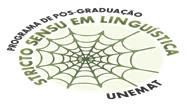Banca de DEFESA: Thalita Miranda Gonçalves Sampaio
Uma banca de DEFESA de DOUTORADO foi cadastrada pelo programa.DISCENTE : Thalita Miranda Gonçalves Sampaio
DATA : 05/10/2020
HORA: 14:00
LOCAL: On-line
TÍTULO:
DISCOURSE AND POETRY: THE EFFECT OF SENSES IN THE PROSODY OF THE SONGS
PALAVRAS-CHAVES:
Discourse; Language; Prosody; Poetic Discourse; Khronos/Kairós; Songs.
PÁGINAS: 89
GRANDE ÁREA: Lingüística, Letras e Artes
ÁREA: Lingüística
SUBÁREA: Teoria e Análise Lingüística
RESUMO:
This thesis, inscribed in the research line of Study of Discursive Processes of the Graduate Program in Linguistics at the State University of Mato Grosso - UNEMAT, aims to understand the discursive functioning of prosody, from the poetic discourse of/in language, formulated in the form of songs. Through Discourse Analysis, we understand that poetry is the language itself, so our reading material is constituted by poetry formulated as a song. The songs we take for reading are Gago Apaixonado, by Noel Rosa (1930), performed by João Bosco; Deixa isso pra lá, by Jair Rodrigues (1964); Pedro Pedreiro (1971) and Joana Francesa (1973), by Chico Buarque; Quilombo (1986), by João Bosco and Custa Nada Sonhar, (1993) by Itamar Assumpção; Roela do Eno (2006), played by Teodoro and Sampaio; Depois da Uma (2001), performed by Mato-Grosso and Matias; Libera o Toim (2003), performed by the group Arriba Saia and, finally, the song 1406 (1996), by the group Mamonas Assassinas. When asking for the prosody at work in the songs, we are considering the song as poetry, at the very moment it is sung, intoned. That is, we cut through the songs, the language in operation, trying to understand how the effects of meaning produced by the poetic speech articulated in/by prosody take place. We seek to understand to what extent, in the linguistic formulation, the Signifiers signify the plasticity of the language in/by the phoneme/rhythm, playing with the possibility of the Signifier to slide to another Signifier. In this direction, we are located outside the logically stable, seeking to understand the senses that are inscribed in the rupture, in the cracks of the language. By taking prosody discursively, producing meaning by the poetic of/in language, we understand the rupture of linearity outside an ideologically/historically plastered structure. It is at this point that poetry materializes the mistake, as it is where the language reaches history.
MEMBROS DA BANCA:
Interno - 260.313.106-00 - OLIMPIA MALUF SOUZA - UNEMAT
Interno - 537.334.289-00 - ELIANA DE ALMEIDA - UNEMAT
Externo ao Programa - 82353001 - HELVIO GOMES DE MORAES JUNIOR
Externo à Instituição - BETHANIA MARIANI SAMPAIO - UFF
Externo à Instituição - MARIA ONICE PAYER - UNIVAS



